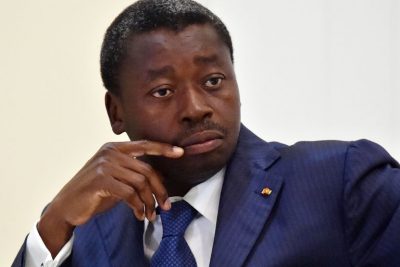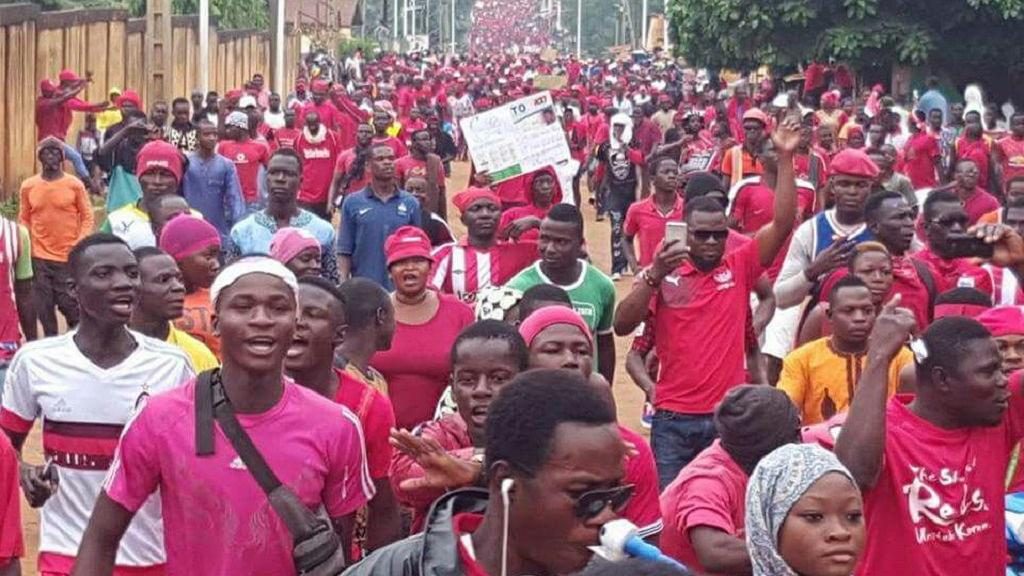Togo Opposition Set for Renewed Round of Anti-Government Demonstrations
Gnassingbe administration fails to assuage mass discontent amid calls for the president’s resignation and major constitutional reform

Featured image: President of Togo Faure Gnassignbe
Togolese officials have reportedly issued restrictions on planned demonstrations scheduled to begin October 18. These actions, which have spread broadly across the West African state in recent months, have been a source of concern by the current government.
Fourteen opposition parties and coalitions are united in an effort to force the removal of the regime of Faure Gnassignbe, the president whose father took complete control of the country as a result of a military coup engineered by France during 1967. Togo has a population of 7.8 million people with a tumultuous history of colonization by Germany, France and Britain.
Anti-government forces were mobilizing for marches the following week when the Minister of Territorial administration, Payadowa Boukpessi, announced at a press conference in the capital of Lome that street demonstrations would not be allowed between Monday and Friday. The spokesperson for the government emphasized that people would be allowed to gather at fixed spots instead of taking to the streets in marches.
Providing a rationale for the restrictions, Boukpessi, who stressed on behalf of the administration that:
“There have been calls for civil disobedience, calls for economic sabotage, even calls for murder issued by protesters targeting the authorities and members of their families as well as security services.” (AFP, Oct. 10)
Since the beginning of anti-government demonstrations in August, the country’s internet services have been periodically shutdown by the administration in Lome.
Despite the government claims of violent tendencies of the opposition groups, the Togolese authorities are responsible for several deaths, the wounding and injuring of scores of people along with the arrests, prosecution and imprisonment of leading political activists. Hundreds of thousands of people have taken to the streets in the last two months calling attention to the machinations of the government aimed at extending its dominance of political power.
The opposition forces are determined to move forward on the actions slated for October 18 with the intended purpose of bringing large crowds into the streets. Brigitte Kafui Adjamagbo-Johnson, a political leader of one of the anti-regime coalitions, said of the announced restrictions by the government that:
“The fight continues. To this end, we are already announcing, for Wednesday October 18, a big march towards the offices of (the West African regional group) ECOWAS in Lome.”
Adjamagbo-Johnson is a longtime political activist who was the first woman to run for president of Togo in 2010. She has worked on various projects designed to enhance the status of women inside the country.
During the largest anti-government demonstrations on October 4-5, Adjamagbo-Johnson emphasized the willingness to negotiate on the part of the opposition saying:
“We can never say no to dialogue. The president himself has not called for any dialogue despite seeing what is going on in this country. We all know that he has heard our messages that we are sending.” (Africa News, Oct. 5)
Eric Dupuy, the spokesperson for the National Alliance for Change (ANC), reiterated that the demonstrations planned for October 18-19 will proceed as originally announced. Dupuy said that the proper legal requirements for notification were met and consequently there is no basis for the announcement by Boukpessi.
“If the government decides to break the law, the people will not respect it,” the ANC spokesperson said. “Wednesday’s march will end on the esplanade outside the National Assembly. The one on the 19th (Thursday), will finish outside the ECOWAS offices,” the West African regional organization.
In response to the demonstrations, the Togo parliament has quickly passed a draft bill calling for term limits on September 15. The legislation would ostensibly mandate a maximum of two terms of office for the presidency, not retroactively, instead moving forward. Opposition parties have criticized the parliamentary actions noting that it would still allow Gnassingbe to run for an additional two terms office extending his tenure potentially to 2025.
Togo opposition on the march for removal of neo-colonial regime in Lome (Source: Abayomi Azikiwe)
Members and supporters of the ruling Union of the Republic (UNIR) party held its own series of demonstrations in support of President Gnassingbe on September 20-21. UNIR has rejected the claims by the Pan-African National Party (PNP), National Alliance for Change (ANC) and the Group of Six, who are all demanding sweeping political reforms.
Nonetheless, opposition members of parliament refused to support the measures saying they did not go far enough in guaranteeing genuine democratic practice. They are calling for the restoration of the 1992 constitution which grew out of a nationwide process of negotiations, debates and discussions.
In the aftermath of the death of former President Eyadema Gnassingbe in 2005, his son Faure, was installed in contravention to wishes of opposition forces. The present leader is currently serving his third consecutive term in the presidency.
Regional and International Implications of the Togo Crisis
The government of Ghana has realized the potential for the conflict in neighboring Togo to spill over into its territory. Togolese refugees have fled across the border fearing an intensification of the political violence. Ghana has strengthened its security on the border with Togo since the eruption of demonstrations nearly two months ago.
In a joint statement on the situation in Togo, the Economic Community of West African States (ECOWAS), the African Union (AU), and the United Nations Office for West Africa and the Sahel (UNOWAS) acknowledged that the political tensions in the country requires constant monitoring by regional and international groupings. The unrest in Togo is taking place alongside other developments in West Africa including the secessionist movements in South Cameroon and Southeast Nigeria, along with the killings of several United States Special Forces troops in Niger.
According to an ECOWAS, AU and UNOWAS press release dated October 4:
“The three organizations take note in particular of the passage of the draft constitutional bill to amend relevant articles of the Togolese constitution. They observe that it is an important step in bringing Togo in conformity with democratic norms reflecting best practices in West Africa. ECOWAS, AU and UNOWAS call on the Government to set a date for the organization of the referendum on the draft bill. They encourage the opposition to take this opportunity to further advance the constitutional reforms.”
This same media advisory goes on to say:
“ECOWAS, AU and UNOWAS appeals to all Togolese political stakeholders to pursue dialogue on this important matter in a peaceful manner, in line with the legitimate aspirations of the Togolese people. They call on all actors to show restraint in order to preserve peace and cohesion in the country because Togo is their common heritage.”
On October 10, the opposition refused offers to meet with a delegation from International Organization of La Francophonie (OIF) which arrived in the country in an attempt to mediate the conflict between anti-Gnassingbe parties and the government. OIF is a relic of the Parisian imperialist system from the late 19th century consisting of representatives of 57 member-states who have French as their national language. The organization was relaunched in 1970 to promote joint projects between France and its current as well as former colonies.
The situation in Togo requires drastic moves on the part of the government. Until a more representative system is established unrest will continue.
Growth prospects for the country remain uncertain due to the agrarian nature of the economy where most people work within the agricultural sector. Cocoa and coffee production represents the major exports while phosphate deposits have played an increasing role since 1970s.


